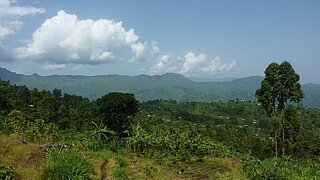Making Green Recovery a Reality – Experiences from Uganda

In this interview, Rebecca Nabatanzi Sserwanga shares her experiences as an economic advisor for the Ministry of Finance, Planning and Economic Development.
In June 2020, the government of Uganda requested support through the NDC Partnership´s Economic Advisory Initiative to advance the country’s green recovery. What were the priorities of the government for a green recovery? What are the most urgent issues in Uganda?
Using a range of fiscal mechanisms, Uganda adopted a two-fold response to the COVID-19 pandemic: on the one hand dealing with the emergency of the health pandemic and on the other addressing the medium-term to long-term recovery of the economy. However, the other urgent issue is climate change, which continues to wreak havoc to the country.
An analysis of Uganda’s economic recovery shows that the government put people first by preparing policy measures to strengthen health systems, but environmental and climate issues were relegated to the back as evidenced by the red fiscal response focused on among others, accelerating development of industrial and business parks.
Which significance does Green Recovery have in the general recovery programme and efforts of the government?
Uganda has put in place a number of strategies to achieve green recovery. There is the Green Growth Development Strategy 2017/18-2030/31 that is guiding Uganda’s green growth agenda. The Third National Development Plan has a full-fledged programme on climate change and mainstreams it in all other programmes. In addition, Uganda has passed the National Climate Change Act 2021. The country submitted its Interim Nationally Determined Contribution (NDC) as a framework for realizing the Paris Agreement and is concurrently developing its Long-Term Strategy.
The coinciding occurrences of the COVID 19 pandemic and the updating process of the NDC with Uganda’s medium-term planning presented a unique opportunity to integrate COVID-19 response and climate action into the Third National Development Plan and annual budgeting.
Although the stimulus package initially supported “business as usual activities” and lacked alignment with green recovery, the post COVID-19 draft NDC is promising greater ambition through a higher emission reduction target.
So far, you supported the Ministry of Finance, Planning and Economic Development (MoFPED) for 12 months. What was your role during this time and what did your day-to-day work entail?
Under this role, I undertook an assessment of the impact of COVID-19 on climate action and developed a Green Recovery Action Plan with six priority areas, including climate finance, digitalization of sectors, resilient transport, urban and built environment, energy and green procurement. In addition, I developed a resource mobilisation plan and a policy paper proposing innovative de-risking instruments, viable tax instruments, penalties and fines. Finally, I developed project concept notes and policy briefs innovative climate financing mechanisms, on building urban climate resilience and on green manufacturing.
Looking back at the past months, what were important milestones on path towards a green recovery? Which developments could you support as an Economic Advisor?
First of all, with the initiative, it is now clear to the ministry that the business as usual economic model has limits in the face of such multiple crises that have ravaged the country. Green recovery has presented an opportunity to include stakeholders at MoFPED who were previously not at the forefront concerning climate change topics.
Alongside increased public investment, MOFPED recognizes the importance of scaling up market-based approaches and private climate finance as a means to achieving Uganda’s NDC targets and a green recovery. To this end, I have spearheaded resource mobilisation and the ministry has received further support to undertake a market assessment to advance innovative climate financing mechanisms including carbon markets and green bonds.
Further, MOFPED is in the process of establishing a climate finance unit, which will benefit from capacity building under the Economic Advisory Initiative.
The enactment of the Climate Change Act 2021 is also a key milestone as it will fast track implementation of the climate change policy especially when followed with relevant regulations. In this regard, I am in the process of supporting MOFPED to develop climate change mainstreaming guidelines for the financial sector.
Did you face any specific challenges in your advisory role?
Limited physical engagements because of lockdown were a challenge as face-to-face interactions often allow deeper engagements and advancement of milestones.
In addition, while Uganda has made progress in recognising climate change as an important development issue, the necessary budgetary resources have not been appropriated. And unfortunately, in the face of COVID-19, the environmental sector is still one of the areas where budget cuts have been made.
What lessons learned could you pass on to practitioners who want to make green recovery a reality?
First, it is important to build the capacities of stakeholders including those who may not have been at the forefront in regard to climate change and green recovery topics.
Second, to address the general perception that a green economy is more expensive than business-as-usual investments, scenario modelling and planning is critical in providing the evidence, i.e. numbers for generating jobs, income, GDP growth and other benefits. This helps to change mind-sets, to inform decision-making and thus enhances policy uptake.
The third lesson refers to the potential of the private sector for mobilising climate finance. The private sector has learned from the multiple crises we are facing and, companies are increasingly looking for opportunities to engage in climate action.
Lastly, let the public know about your plans and progress, to enhance the visibility of all efforts towards a green recovery and to mobilise partners and support.
The link has been copied to the clipboard
Contact
IKI Office
Zukunft – Umwelt – Gesellschaft (ZUG) gGmbH
Stresemannstraße 69-71
10963 Berlin
The interview partner

Rebecca Nabatanzi Sserwanga is an Environment Governance Specialist working on climate change and green growth with vast experience in public policies, environment economics and climate finance. Within the Economic Advisory Initiative, she is advising the Ministry of Planning and Economic Development on greening the economic recovery.
The Economic Advisory Initiative

The Corona crisis has affected the world in unprecedented ways. Developing and emerging countries are particularly challenged to deal with the consequences of the pandemic. IKI is therefore supporting the "Economic Advisory Initiative", which was launched in 2020 by the NDC Partnership. Economic experts are being funded to advice governments in eight partner countries on how to shape a green recovery.
Further information
The IKI supports activities that build on the work of Rebecca Nabatanzi Sserwanga after her first year as an economic advisor. This includes the conception of innovative financing instruments for adaptation and mitigation activities, such as carbon markets, and the development of project proposals to implement these instruments.


